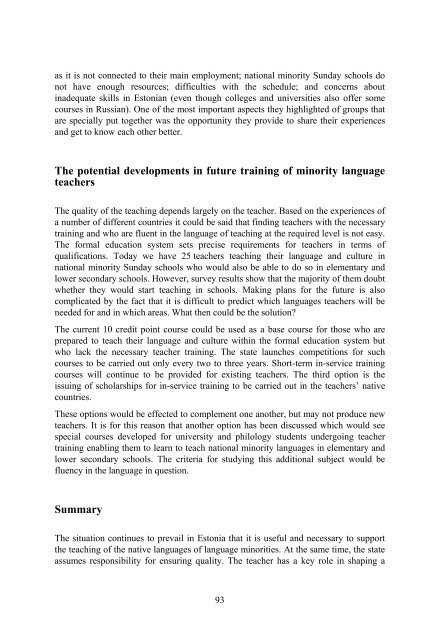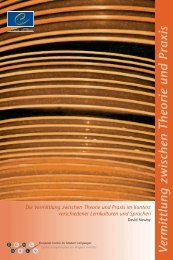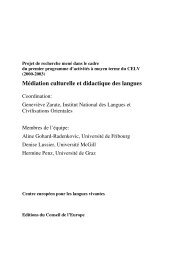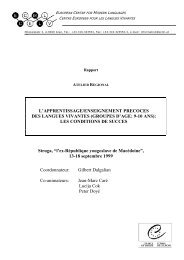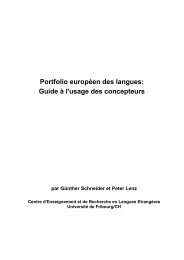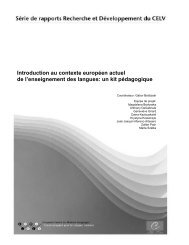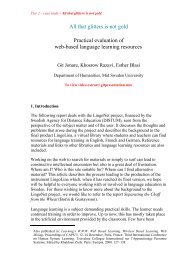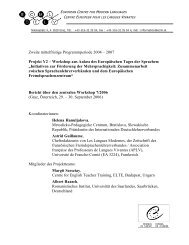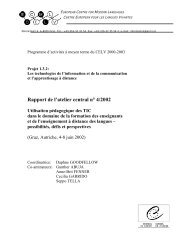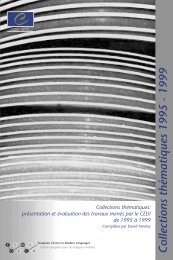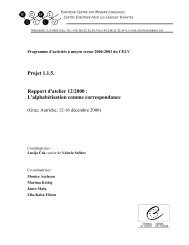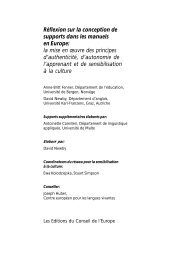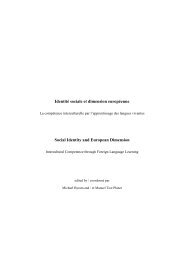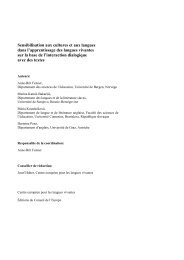cohesion - European Centre for Modern Languages
cohesion - European Centre for Modern Languages
cohesion - European Centre for Modern Languages
Create successful ePaper yourself
Turn your PDF publications into a flip-book with our unique Google optimized e-Paper software.
as it is not connected to their main employment; national minority Sunday schools do<br />
not have enough resources; difficulties with the schedule; and concerns about<br />
inadequate skills in Estonian (even though colleges and universities also offer some<br />
courses in Russian). One of the most important aspects they highlighted of groups that<br />
are specially put together was the opportunity they provide to share their experiences<br />
and get to know each other better.<br />
The potential developments in future training of minority language<br />
teachers<br />
The quality of the teaching depends largely on the teacher. Based on the experiences of<br />
a number of different countries it could be said that finding teachers with the necessary<br />
training and who are fluent in the language of teaching at the required level is not easy.<br />
The <strong>for</strong>mal education system sets precise requirements <strong>for</strong> teachers in terms of<br />
qualifications. Today we have 25 teachers teaching their language and culture in<br />
national minority Sunday schools who would also be able to do so in elementary and<br />
lower secondary schools. However, survey results show that the majority of them doubt<br />
whether they would start teaching in schools. Making plans <strong>for</strong> the future is also<br />
complicated by the fact that it is difficult to predict which languages teachers will be<br />
needed <strong>for</strong> and in which areas. What then could be the solution?<br />
The current 10 credit point course could be used as a base course <strong>for</strong> those who are<br />
prepared to teach their language and culture within the <strong>for</strong>mal education system but<br />
who lack the necessary teacher training. The state launches competitions <strong>for</strong> such<br />
courses to be carried out only every two to three years. Short-term in-service training<br />
courses will continue to be provided <strong>for</strong> existing teachers. The third option is the<br />
issuing of scholarships <strong>for</strong> in-service training to be carried out in the teachers’ native<br />
countries.<br />
These options would be effected to complement one another, but may not produce new<br />
teachers. It is <strong>for</strong> this reason that another option has been discussed which would see<br />
special courses developed <strong>for</strong> university and philology students undergoing teacher<br />
training enabling them to learn to teach national minority languages in elementary and<br />
lower secondary schools. The criteria <strong>for</strong> studying this additional subject would be<br />
fluency in the language in question.<br />
Summary<br />
The situation continues to prevail in Estonia that it is useful and necessary to support<br />
the teaching of the native languages of language minorities. At the same time, the state<br />
assumes responsibility <strong>for</strong> ensuring quality. The teacher has a key role in shaping a<br />
93


